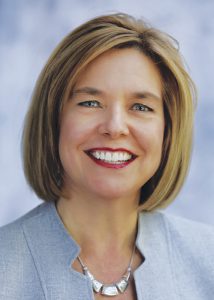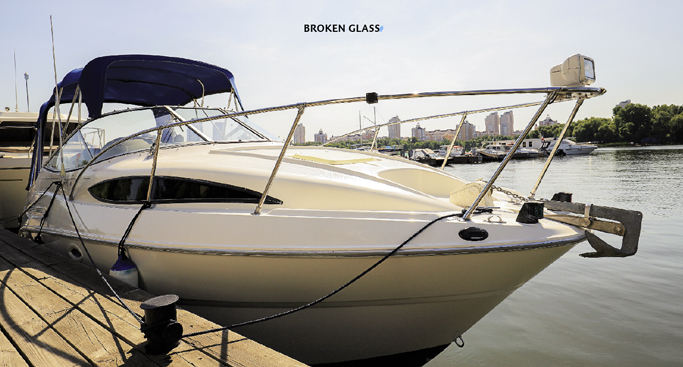WHATEVER FLOATS YOUR BOAT
California broker succeeds in the complex world of marine risks
By Elisabeth Boone, CPCU
Summer is just about here, and boaters across the country are reveling in the departure of colder weather and enthusiastically launching their watercraft for a new season on the water. Ranging from modest outboard motorboats to elegant yachts, these craft and their docks are subject to a variety of loss exposures, from minor scrapes to major collisions.
Standing ready to support the marine industry is Business Development Specialist Barbara Galgiani, CPCU, CIC, CRM, CWCA, of LP Insurance Services, LLC, in Gold River, California. LP has 11 offices across California, Nevada, Arizona, and New Mexico that are supported by more than 200 employees. In addition to marine insurance, the firm serves the construction, public entity, medical, professional, agriculture, cannabis, real estate, mining, and manufacturing industries. LP also offers employee benefits, risk services, and surety bonds.
Galgiani joined LP in 2018 after a20-plus-year career with another California brokerage. With a team of two account managers and an assistant, she insures boat rental operators, marinas, boat manufacturers, and recreational boat repair facilities. In the last couple of years, she had expanded into marine construction, and it was one of the factors she considered when making the switch to LP Insurance Services.

“Women can view a situation from two perspectives: one from their position as leaders and the other from the perspective of women who will implement a process.”
—Barbara Galgiani, CPCU, CIC, CRM, CWCA
Business Development Specialist
LP Insurance Services, LLC
“We have support people on staff who specialize in contracts, as well as attorneys who can review contracts from an insurance perspective,” Galgiani explains. “We also have a surety department for clients who need bonds.”
LP’s risk services department employs12 people, including attorneys who can assist producers with pre-claims and post-claims guidance. The firm also has a loss control department that includes a former OSHA employee. The unit’s employees meet with clients to inspect and implement safety measures and suggest improvements to their loss control programs. They also hold safety meetings with employ-ees in the event the employer has experienced an incident involving its workers.
LP Insurance Services also has a human resources unit that works with clients to ensure that their employee manuals are up to date and that their audits are in compliance with ever-changing regulations.
Launching a career
After graduating from high school, Galgiani joined an insurance company as a file clerk. “You can’t get any more entry level than that,” she says with a laugh.
Once she had completed basic insurance educational courses, Galgiani pursued The Institutes’ INS 21, 22, and 23 series. “I then moved to the agency side at Westmar as a CSR for the president, R.J. Lorenzi. He was extremely pro education, and he helped me sharpen my skills while reading a policy or analyzing a risk. He encouraged me to work on my CIC designation, and after completing that program I realized that if I ever wanted to seriously pursue an insurance career, I needed to attain the CPCU designation. At the same time as I was pursuing that designation, I began to make a transition into sales.
“I left Westmar and joined CAPAX in Modesto. It recently was purchased by Hub. While I was at CAPAX, I completed my CPCU designation and then pursued the Certified Risk Manager (CRM) designation. I did this because risk management is often an alternative to insurance. In that program I learned how to look at situations from a client’s point of view, where insurance isn’t viewed as the automatic solution to a given exposure.”
Galgiani relates a funny story about the CPCU designation: “I had completed nine of the 10 parts of the program, and my last course was insurance company operations. The convention that year was to be in Texas, and I told everyone I was going to change my business cards to add CPCU to my name. I even made arrangements to share a room with a friend. Then I was notified that I had failed the exam. I was horrified and so embarrassed! It was a humbling experience; I realized I wasn’t quite as smart as I had thought I was.”
The accounting course, Galgiani says, has turned out to be an asset for her. “It’s so helpful when I’m looking at a client’s profit and loss statement, analyzing losses and asking whether the client should consider a high-deductible plan or a retro-active plan. That accounting class gave me an excellent foundation. Also, the CRM program has a section that’s all mathematics and economics, and although I’d never be able to fool anybody that I’m a CPA, I can look at financial statements and consult an underwriter if I see some-thing that doesn’t look right.”
Changes in attitudes
What were attitudes like toward women in insurance when Galgiani started her career, and how have they changed since then?
“A lot of what’s changed in the insurance business is what’s changed in all industries,” Galgiani responds. “I was never a victim of sex discrimination or inappropriate touching, but we all knew that existed. Today, especially given the #MeToo movement, I doubt that blatant discrimination would occur. At my former agency, the CEO would take male producers out for dinner or drinks, and I was never on the list of invitees. I was fine with that because I didn’t want to have a cocktail after work. I was the only female producer in that office, and in hindsight I wonder if that’s why I wasn’t invited or if the CEO was uncomfortable for some other reason. I’m not sure, but I may have missed out on some opportunities by not attending,” Galgiani says.
“In any event,” she continues, “the days of going out for cocktails after work may no longer exist. The same may be true of business lunches with cocktails where men are in the majority.
“I travel a lot, and most of my clients are men, possibly because of the nature of the marine industry,” Galgiani says. “My husband, John, is retired, and he travels with me on business fairly regularly, so my clients all get along with him well. We do a lot of socializing with them as couples, and that strengthens our relationship.”
Galgiani comes from a large family with two sisters and four older brothers. “Our brothers would pick on us girls, but if someone outside the family tried to do that, our brothers would come in and defend us,” she says with a chuckle. “We’re spread out across the country now, but we’re close and often have Zoom cocktail gatherings.”
What unique qualities does Galgiani think women bring to leadership positions in the insurance industry?
“The main quality I observe is that women can view a situation from two perspectives: one from their position as leaders and the other from the perspective of women who will implement a process,” Galgiani says. “Sometimes a decision may be made, for example, to offer a certain coverage to all clients. Let’s say it’s cyber insurance. At an upper management level, the concern may be protecting clients from errors and omissions exposures. That sounds like a good idea, but at the service level it’s not as simple as looking at a chart and selecting a premium for the coverage. The service people will need to complete applications and possibly worry about frustrating underwriters because the hit ratio isn’t high and, ultimately, it’s a lot of extra work that falls on the service team’s desk.
“A few years ago, I decided I wanted to offer cyber insurance to all of my clients,” Galgiani continues. “I devised standard wording that my account manager could put into the proposal with a range of anticipated premiums. That way I could talk with each client about cyber insurance, and if they decided they wanted to purchase it, we would then complete the application. I knew with about 90% accuracy that the premium would fall into that range.
“When I asked an account manager to process the paperwork and secure a quote, he or she understood that the client was going to buy the coverage. If I had never worked at a desk, I doubt I would have understood how much time it would take to obtain quotes.
“Understanding the process from both sides, I can have a conversation with a service team member and ask them how they would handle a situation differently and still achieve the same goal,” she adds.
Opportunities abound
How would Galgiani characterize opportunities for women in insurance leadership positions?
“There are so many opportunities both at the entry level and also for people in senior positions,” she responds. “When you consider all the changes that have occurred in the brokerage industry, especially with COVID, many offices were already offering some employees the opportunity to work remotely. When COVID hit, most of us realized that many employees would never need to enter an office, so we could expand our hiring pool.”
What advice would Galgiani offer to a young woman who may be considering a career in insurance?
“Jump in!” she says enthusiastically. “Find a mentor who can provide some career guidance. Pursue education that is specific to the insurance industry. That education will offer the chance to network with other professionals in our industry who will open additional opportunities.”
The author
Elisabeth Boone, CPCU, is a freelance journalist based in St. Louis, Missouri.
Do you know a female independent agency leader we should feature? If so, please email details about her as well as contact information to Elisabeth Boone, CPCU (elis.boone@icloud.com). We’ll take it from there.





